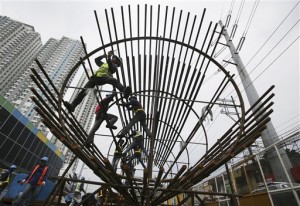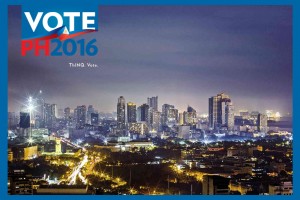PH likely to grow 6% in 2016 regardless of who next President is – Global Source
MANILA — The Philippine economy may be able to sustain a growth rate of at least 6 percent through 2017, whoever the nation elects as the country’s new CEO on May 9.
This is the view of New York-based think tank Global Source, which had assumed that the economic momentum would continue at least for this year and next year, citing the presidential candidates’ commitment to good governance and ramping up infrastructure spending.
Veteran banker Alberto Villarosa, Security Bank chairman, said on Tuesday that after the May 9 elections, “business will continue to be bullish regardless of which presidential candidate wins.”
“We never felt any of clients to hold back or abort expansion plans,” added Security Bank president Alfonso Salcedo Jr., noting that all over the country, people seemed to be bullish.
As this developed, the camp of Davao City Mayor Rodrigo Duterte assured stock market traders that there would be no shake-up in the financial market under the prospective presidency of Duterte, now the leading presidential contender based on the most recent polls.
Article continues after this advertisementGlobal Source economists Romeo Bernardo and Marie-Christine Tang, in a research note dated April 22, said the domestic economy continued to chug along in the first quarter, “seemingly unmindful that the growth engines elsewhere are stuck in low gear or worse, in reverse.”
Article continues after this advertisement
Aug. 12, 2015: Government road project in suburban Quezon City, north of Manila, Philippines. (AP Photo/Aaron Favila)
“While export sales have continued to slump, internal growth drivers, particularly consumer and government spending, appear intact benefiting chiefly from low oil prices and election spending, with remittance inflows remarkably resilient and further amplified by a weaker peso,” the research said.
Notwithstanding leakages via increased imports, many expect the first quarter gross domestic product to advance at a higher clip year-on-year, the research note said.
“Looking at the next 12 to 18 months, the crucial question for the local economy is, can the next president, to be elected in about two weeks’ time, govern well and deliver on promised infrastructure spending? The answer depends first, on the credibility of the electoral process and outcomes and second, on the leadership skills of the next president. While we continue to expect a smooth transition, the close race to date suggests that the winner will likely have only a minority share of the votes and will have to be adept at forming alliances, especially in congress, to get reform done. He/she will also have to score early successes to establish a track record of his/her ability to get things done,” the research note said.
The assumption that growth could be sustained at the 6 percent average attained during the outgoing administration, Global Source said, was because the next President would have the incentive to prove him/herself better than this administration, striving to meet public spending targets to boost short-term growth and take steps to address investor concerns.
“On the other hand, the risk of an antagonistic successor remains which may have a dampening effect on investor moods and thence economic growth, a downside to our forecast,” Global Source said, adding that downside risks other than local elections continued to dominate at this time, traced to the many external uncertainties.
“The perception of uncertainty always comes during the last few weeks of the election but under the Duterte administration, the stock and financial market will be protected and it will be business as usual,” Peter Laviña, Duterte’s spokesperson said on Tuesday.
“Fostering fear and uncertainty is part of the scare tactic and black propaganda against presidential frontrunner Rodrigo Duterte,” he added.
He noted that Mayor Duterte had repeatedly assured that he would provide business the right and proper atmosphere to prosper without sacrificing the general welfare of the people. Laviña cited how Davao City had grown “from lethargy during the 1980s to become one of the most progressive cities in the country and listed as one of the most livable in Asia.”
Laviña said Duterte had early on exhibited a very clear business policy, getting rid of crime, urban rebels, street eyesores and traffic to make Davao city conducive for business when he became city mayor in 1988.
He noted that in 1992, upon the passage of the Local Government Code, Duterte pioneered in local investment promotion by launching the “Invest in Davao” project. The mantra was that: “we welcome investments for as long as they do not abuse our labor, women, children and the environment.”
Laviña also cited the assistance of the International Finance Corporation of the World Bank in cutting red tape in business permit processing in Davao City. He said this had led to the mayor’s firm policy to approve such permits within 72 hours and to impose strict discipline on city employees against graft and corruption.
He said Duterte was “not without such vision for the economic progress of the country,” citing the platform for agricultural, industrial, technological advancement and the development of the various regions of the country through federalism. SFM
